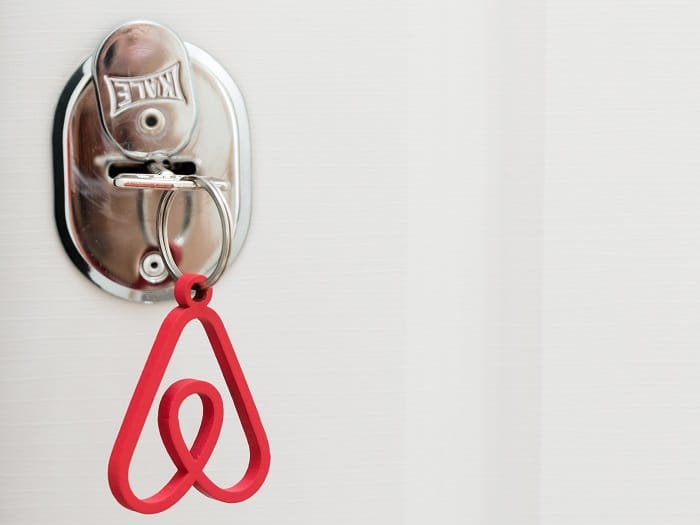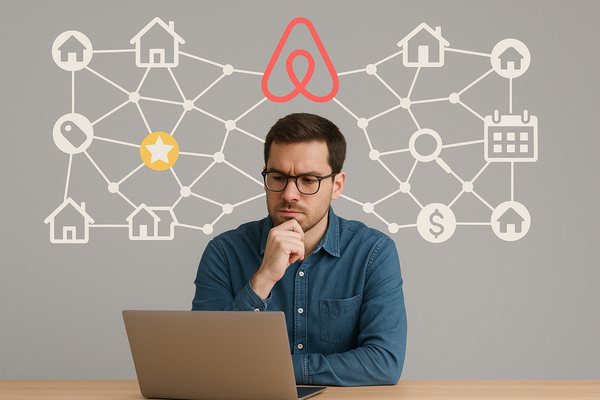Airbnb Host Guarantee: Will It Always Protect You?

Does the Airbnb Host Guarantee Really Protect You? Airbnb’s Host Guarantee and AirCover offer some protection, but they’re not comprehensive and come with limitations that can leave hosts vulnerable. This article unpacks the terms, exclusions, and best practices for filing claims while sharing proactive tips to better safeguard your business.
Let's debunk some myths and common misunderstandings about the Airbnb Host Guarantee. Newbies who have heard about Airbnb insurance often think it can protect them no matter what. Then, they hear stories about Airbnb hosts being refused reimbursement for damage, and doubts start to creep in.
Does Airbnb's Guarantee really protect my property? What are the terms and limitations? How many hoops do I need to jump through to get a refund, and will I be refunded at all? What are the concrete steps I can take when a nightmare guest trashes my property, a kid scratches my TV, or a pet chews up my $1200 couch (we pulled all these scenarios from rare but real experiences of running an Airbnb business)?
Let's unpack the basics: What is the Airbnb Host Guarantee, and what is it not?

What's Airbnb AirCover - Airbnb's Host Protection Program?
Airbnb rolled out AirCover for hosts in November 2021, replacing the Host Guarantee with a more comprehensive protection program. In a nutshell, the Airbnb Host Guarantee is still part of it, but now it’s included in a broader program that covers more, which we'll dive into shortly.
A common misconception among hosts and property owners is to treat the Host Guarantee and AirCover program as insurance. It's not insurance. However, it's a guarantee.
Airbnb's protection program covers your property during a guest's stay and damages caused by guests. However, there are certain conditions under which you may not be eligible for a refund.
Think of it as a safety net rather than a comprehensive insurance policy. It offers support in specific scenarios but comes with limitations and exclusions. To fully safeguard your property, you might still need separate homeowner's and STR insurance.
Let's explore the key terms and conditions of AirCover to understand how it benefits you as an Airbnb host.
In What Situations Does Airbnb Guarantee Apply?
The Airbnb Host Guarantee is designed to cover damage caused by guests during their stay in your Airbnb property. This policy acknowledges that mishaps can occur in your Airbnb business.
According to the terms of the Airbnb Host Guarantee and AirCover, there are several areas where you can receive reimbursement:
- Property damage
- Income loss
- Deep cleaning
- Host's liability
Let’s take a closer look at each.
Property damage occurs when a guest or their invitee damages, breaks, or destroys something in the house, whether intentionally or not. It’s important to distinguish between damage and wear and tear, which is the gradual deterioration of items. For example, throwing a party, trashing the apartment, and leaving a disaster would be considered damage. Or the consequences of a pet owner leaving their pet unattended.
It’s worth noting that responsible guests are far more common than negligent ones.
In a critical situation where deep cleaning is required, Airbnb will cover the cleaning costs and compensate for the income lost from canceling the next reservation. This is the Host Protection Guarantee at work.
Liability is covered under a special program called Airbnb Protection Insurance. It’s activated when a guest gets injured on your property. However, there’s a caveat: if the property didn’t meet safety standards initially, you won’t be eligible for liability insurance. Hosts are responsible for ensuring their property meets safety standards to create a safe environment for guests.
When Do the Airbnb Host Guarantee Terms Not Apply?
As we just mentioned, wear and tear aren’t considered damage, so the policy does not cover them. Faulty workmanship, materials, and construction are also the host’s responsibility.
A complete list of situations where the policy doesn’t apply is stated on Airbnb’s website:
- Damage from normal wear and tear
- Loss of currency
- Loss due to acts of nature (e.g., earthquakes and hurricanes)
- Injury or property damage to guests or others (these may be covered by Host Liability Insurance)
- Cleaning associated with normal check-out tasks (e.g., laundry, dishes, or trash removal)
- Other limitations
To clarify, this policy has some additional limitations, such as shared and common areas not being covered by the Host Guarantee (only the lodging is covered).
Airbnb is strict about the fact that damage protection only applies during the guest’s stay and not after the booking period has expired.
Additionally, they won’t cover utility issues like:
- Excessive use of electricity, gas, fuel, water, or other utilities
- Loss of electricity, fuel, water, gas, steam, refrigerant, sewerage, telephone, or internet services due to external factors
While illegal occupants and squatters aren’t typical concerns for short-term rental owners, it can potentially happen with some monthly stays because these fall under the umbrella of long-term stays. Bear in mind that, in this particular scenario, Airbnb insurance won’t cover the expenses of the eviction process.
This was an overview of terms and limitations. Now, let's see what policies are included in the Aircover.

Two Types of Airbnb Host Protection Policies
To break it down, there are two protection policies that are part of AirCover. (To be precise, there's also a third one, but that one applies to Experiences, so it's outside the scope of this article.)
One is Host Damage Protection, and the other is Host Liability Insurance.
Airbnb Host Guarantee (Airbnb Host Damage Protection)
This protection program is in place against damages like direct physical loss, extra cleaning costs, smoke odor removal, and income loss as a consequence of canceling future bookings.
What does the Airbnb Host Guarantee cover? Hosts should independently check out and read the policy carefully to learn about all specific use cases.
Thanks to this policy, you can get up to $3 million for damages.
If we'd break it down to the most important points from Airbnb's policy, those would be:
- Damage to your home, furnishings, valuables, or belongings caused by guests (or their invitees)
- Damage to parked cars, boats, or other vehicles caused by guests (or their invitees)
- Extra cleaning costs required to remove stains left by guests (or their invitees) or pet accidents, smoke odor removal, or when required due to additional unapproved guests
- Income lost if you need to cancel on a guest for the next booking due to damage caused by a previous guest (or their invitees)
The Airbnb Host Guarantee program brings peace of mind to your business. However, be prepared for a bit of a slow reimbursement process, as it requires jumping through several hoops to prove to Airbnb representatives that guests caused the damage.
Depending on the situation, the entire process—from the reimbursement request to receiving payment—can take up to around one month.
Keep reading to learn the exact steps and best practices for reimbursement later in the text.
Airbnb Host Liability Insurance
Host liability insurance will cover the host in case something bad happens to a guest during their stay. It can cover any kind of bodily injury when an unfortunate event happens and a guest gets hurt in your house.
This insurance policy also applies to their belongings being damaged or stolen while they’re staying at your place.
The policy provides up to $1 million in coverage for Airbnb hosts.
Airbnb states it applies in these cases:
- Bodily injury to a guest (or others)
- Damage to or theft of property belonging to a guest
- Damage caused by a guest (or others) to common areas, like building lobbies and nearby properties
To reaffirm the important point: The host is in charge of making sure their Airbnb property is a safe place to stay. If a mishap occurs due to faulty furniture or appliances, and the host was already aware of the issue, liability could likely fall on the host.
Let's discuss one real example.
One of the questions newcomers have is: By checking off that my place is family-friendly, do I expose myself to additional liability?
Does "family-friendly" imply that you need to have a variety of different child safety features, including safety gates, outlet covers, corner covers, and pool fencing? Is this really necessary to be seen as a family-friendly place?
Keep in mind that you should do research for yourself, but many hosts don't have each of these very specific protective measures in place. Maybe you don't have to provide all child-proofing equipment, but it is certainly a good idea to provide some of them, and state in your house rules what you provide or don’t provide, and note that children are not to be left unsupervised during their stay.
In the end, many hosts decide to take a third-party insurance policy as another layer of protection.

The Most Effective Way to Submit a Claim and Get Reimbursement
Filing a claim might not seem like a straightforward process in the beginning. However, once you understand the best practices, you'll be confident in going through the whole process and getting reimbursement.
Be prepared for a lengthy process that can take a few weeks. The good news is that when you have the proper evidence and follow the steps, Airbnb adjudicates the damage fairly.
Now, we'll guide you through the steps to file a claim and get paid without getting into a conflict with guests along the way or prompting them to leave you a bad review.
Negotiate With the Guest First
Airbnb wants you to negotiate with a guest before submitting a claim. In many cases, this is how you solve the issues. Conscientious guests are often willing to pay for unintentional damage they make.
Once you notify the guest about the damage and understand they don't plan to refund you out of their own pocket, you will contact the Airbnb Resolution Center.
When messaging a guest, suggest a reasonable timeframe for a response, such as 24 to 48 hours after you’ve notified them about the damage. If they don't respond, mention a clear deadline for their reply before you need to involve Airbnb’s Resolution Center.
Handle Disputes Like a Professional
A goal is not to get into a fight with guests but to build positive guest relationships. The key is staying professional; after all, this is a business. Never fault the guest directly, even if they trashed the apartment.
Instead, describe what you saw after they checked out and ask if they know anything about how it happened. For example: "We noticed some damage in the apartment after your stay. Could you help us understand what might have happened?" Remember that keeping a calm and composed tone can help maintain a positive relationship and increase the chances of a cooperative response.
Contact the Airbnb Resolution Center
Finally, if the guest doesn’t respond or refuses to offer a refund, it's time to contact Airbnb’s Resolution Center. You should send them a message describing the situation and providing any available proof.
Important note: All communication with the guest should take place through the Airbnb platform, as this serves as proof during the resolution process.
14 days Limit to File a Claim
You have 14 days after the guest checks out to file a claim. During this time window, you must also wait for the guest to respond and try to negotiate with them, so just bear that in mind so the time doesn't slip through the cracks. You will also need to provide evidence like photos, estimates of the damage from a responsible service, and bills.
After you have submitted a claim on time, you have 30 days to settle it and send a payment request form to the Airbnb team.
Prove the Guest Has Caused the Damage
As mentioned above, you need proof—the more, the better. Proof can include photos, videos, repair or cleaning estimates, bills, communication with the guest on the platform, and other verifiable forms of evidence. Ideally, you want to have before-and-after pictures or videos.
Important tip: If your apartment or a piece of furniture needs deep cleaning after a negligent guest, keep in mind that you can't get reimbursed for both deep cleaning and furniture replacement. You must choose only one.

What's the Minimum Reimbursement Amount for Airbnb Hosts?
Airbnb does not specify a minimum reimbursement amount for damage claims under its Host Damage Protection program. However, many hosts don't bother to file a claim if the damage is under $100.
Since it can be a lengthy process that requires thorough documentation and comes with the risk of a bad review (even if a bad review can be resolved, it's still a hassle), you need to estimate whether it's worth your while to pursue smaller claims.
Do I Need to Pay for Airbnb Host Protection Guarantee Program?
No, the Airbnb Host Protection Guarantee is assigned to hosts automatically at no extra cost. The only thing hosts pay is a regular fee for bookings. The AirCover program is designed to protect its users, active hosts, and it is activated when you contact the Airbnb Resolution Center after the damage has occurred and the guest has checked out.
How to Overcome Limitations of Airbnb Host Guarantee?
Airbnb Host Guarantee may not be perfect and has some limits, but it does protect hosts in many situations. You can add some additional layers of protection like:
Security Deposit
On Airbnb, you can add a standard security deposit that will be held and fully refunded if no damage occurs during the stay. If you decide to charge a deposit, ensure it doesn't exceed 20% of the booking price. The typical security deposit ranges from $100 to $500 per booking.
While security deposits have their advantages, they can sometimes be a drawback for Airbnb hosts since they increase the total cost, which may put off potential guests. The decision is entirely up to you. You can always test your listing both with and without a security deposit to see if it affects your occupancy rate.
Damage Waiver Fee
A damage waiver fee is a small, non-refundable charge that covers unintentional damage during a guest's stay. This fee is significantly lower than the security deposit. However, since it's non-refundable, you keep the money after the guest checks out. It's important to note that this fee only covers unintentional, non-malicious acts and damages.
Some hosts prefer this option because they can use the accumulated fees over time to cover unexpected repairs or cleaning costs. When guests pay the damage waiver fee, they are typically released from liability for any accidental damages that occur during their stay. Should you decide to implement this fee, make sure to state it clearly in your rental agreement.
Get STR Insurance From an Insurance Company
As Airbnb states, the Host Protection Program is not insurance, and Airbnb even suggests you take out full insurance.
Why would you need to pay for third-party insurance when you have some form of damage protection on Airbnb? Getting insurance from an insurance company is the best way to navigate the limitations of the Airbnb Host Guarantee coverage. Airbnb only covers you for specific types of property damage, which leaves a gap wide open when it comes to theft, vandalism, or damage from natural disasters.
Plus, STR insurance applies at all times, not just during the guest’s stay on Airbnb, which is especially important if you plan to drive direct bookings. It comes with higher coverage limits and can protect you better from liability issues. Choose an insurance company that specializes in short-term rental protection.
Homeowners' insurance typically does not cover commercial activities like short-term rentals, leaving you vulnerable to risks associated with hosting guests. Therefore, relying on it alone is not enough to ensure comprehensive protection for your property and liability. Luckily, many insurance companies now provide services to STR hosts.
Protective Measures
Prevention is sometimes more effective than the best solutions. What are the protective measures that can save you from bad scenarios?
Establish House Rules
Having clear house rules sets expectations upfront and serves as a valuable protection for your property. While some guests may overlook them, written rules provide crucial legal documentation if disputes arise. For instance, if you have a strict no-pet policy, you can refer to these rules when addressing violations.
The more specific your house rules are about your property, the better they will protect your interests. Consider highlighting the most critical rules in your listing description and in a printed guide at the property.
Install Security Surveillance Equipment
What could be a better prevention measure than having a camera installed surveilling your entrance? At least when it comes to illegal parties or unauthorized pets. Even if you're allowed to have cameras in outdoor and common spaces, many hosts are reluctant to install them. It requires an upfront investment, and they don't want to make guests feel watched and uncomfortable, or they think monitoring footage requires a time commitment they're not willing to put in.
The decision is entirely up to you, but there are also smart alternatives to cameras: smart locks, noise and CO2 detectors, temperature monitors, power usage monitors to detect unusual behavior.
Guest Screening
Airbnb has an identification check-in process, but it is not very strict, so you want to make sure you don't accept all guests, especially if they already have a bad reputation. All things considered, having your own vetting process in place is better.
Professional screening services can also help protect your property by vetting potential guests before they book. They can cross-check guest IDs against government databases, check for prior rental property damage claims, flag suspicious booking patterns, etc. This is particularly important for monthly bookings and high-end properties.
If you're doing it manually, pay attention to common red flags like:
- Incomplete profiles
- Poor or no reviews
- Last-minute bookings
- Evasive or inconsistent communication
- Requests for rule exceptions
- Unverified identity
- Unusual payment requests
Do Airbnb Hosts Give Refunds to Guests?
Airbnb hosts can offer refunds to guests on their own. Refunds are usually given for cancellations. This means that a host can refund a guest even if a cancellation policy protects the host.
For example, a guest might book a stay but later have a family emergency, making it impossible to travel. Even though the host's cancellation policy may not require a full refund, the host can decide to issue a partial or full refund to accommodate the guest’s situation.
A host can ultimately decide on a refund if they believe it will strengthen guest relationships and encourage guests to return. Leaving a lasting positive impression and building a reputation is a choice.

Takeaway
The Airbnb Host Guarantee is a powerful protection program that encourages business owners to run the Airbnb business with peace of mind.
No, it's not an all-in-one insurance coverage that will protect you in every single case, but it has your back for the most common issues. We still recommend you get STR insurance from a reputable insurance company to ensure protection in other situations when AirCover doesn't apply.
Another way to make your business thrive and build a reputation as a stellar host is by using vacation rental software like IGMS. Automating messages you access from a unified inbox, automated guest reviews, and a channel manager that ensures you never face conflicting situations like double bookings are just some of the features that will help your Airbnb business thrive. Check out the rest.






